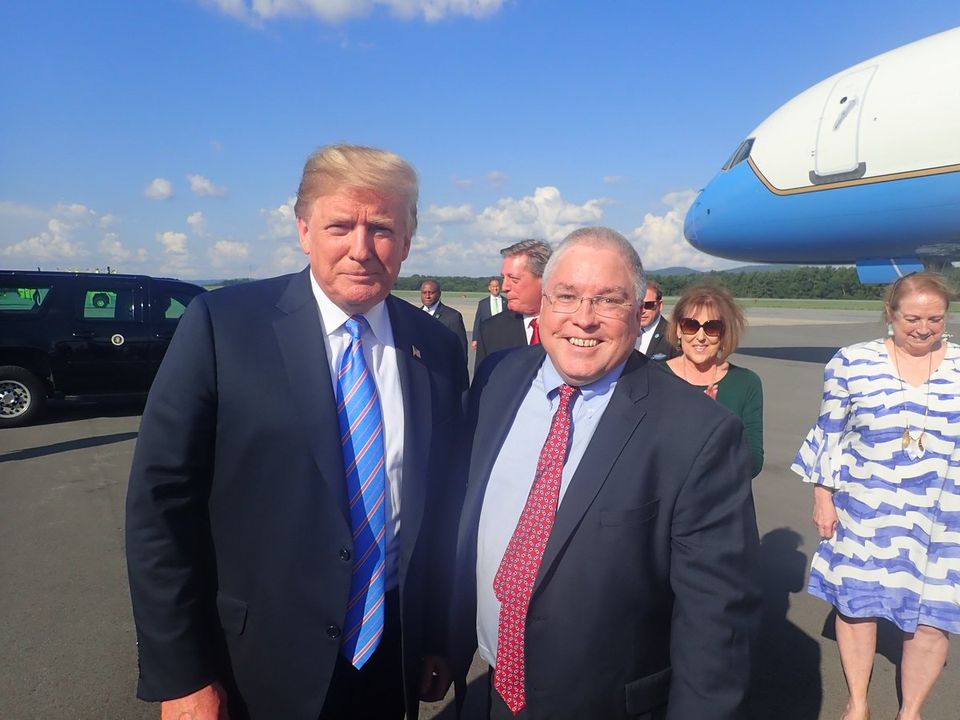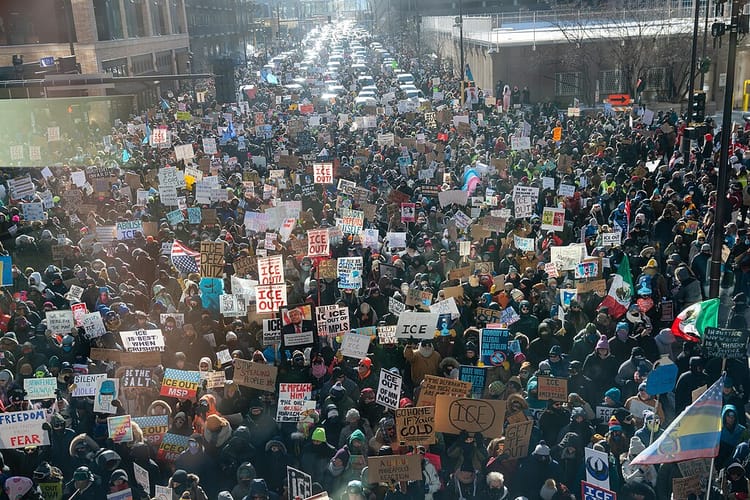Damages: West Virginia Is Giving Texas a Run for Its Money on Climate Obstruction

A few weeks ago we had Jesse Coleman, with Documented, walk us through how the same dark money network that once funded climate denial is now funding state treasurers in an effort to push back against so-called “woke capital.” It’s a reference to environment, social and governance guidelines in the finance space, or ESG. Which…if anything has mostly been a handy greenwashing tool for a lot of polluting industries. Until the Securities and Exchange Commission announced that the next phase of its ESG plan: a requirement that companies disclose their climate risk. Seems logical enough. But remember, Coleman told us that the anti-ESG crowd are reaching way back into the vault of climate denial, claiming not only that climate change isn’t happening, but that actually more CO2 in the atmosphere is a net gain. "You know, CO2 isn't bad for you, it's causing a great greening of the earth," he said.
He also told us about one state treasurer in particular: "Riley Moore, the treasurer of West Virginia, who's a real leader of all of this was actually on a podcast with the head of S F O F [the State Financial Officers Foundation]," Coleman explained. "And he was talking about why the state treasurers are so perfect as a weapon against climate policy. And he said, 'the attorneys general, right, they have to work through the court. I speak with the taxpayer's money. With the stroke of my pen, I can change things and it doesn't have to go through the court system.'"
That podcast is called Gallantly Streaming, by the way. Who knows why. It’s the State Financial Officers Foundation podcast. Here’s Riley Moore speaking with them in February 2022:
We're statewide elected. And so we're able to kind of speak with the taxpayer dollars, uh, is what I'd say. And because you're not just a bureaucrat in here, you are an elected official and you are there to represent the equities and interests of your constituents. And you can do that in a way that's uniquely different than say attorney generals do where it's, they might sue over a certain issue or something. This has more of an immediate effect. Um, and at the end of the day, citizens are paying taxes. Industries are paying taxes to the state in which you manage those dollars. And so there is I believe, a responsibility to have those dollars invested, um, in a manner that reflects the interest and equity of your constituents.
Moore became a real hero of the anti-ESG right when he kicked Blackrock out of West Virginia in January 2022, after CEO Larry Fink encouraged American companies to commit to carbon neutrality. It’s interesting that he specifically notes how much more treasurers can do than attorneys general because guess who else is getting in on the anti-ESG action?
That’s right, Patrick Morrisey, Attorney General of West Virginia, the man who brought West Virginia vs. EPA to the Supreme Court earlier this year. At a press conference about that case he said: "This is not a case about climate change. This is a case about separation of powers and ensuring that the legislative branch steps in and at unelected bureaucrats, don't try to weigh in when they don't have power to."
As we've covered before, the ruling in that case doubled down on a convention entirely manufactured by Supreme Court justices in recent years, something they call the “major questions doctrine.” And don’t be fooled by the “doctrine” part there’s nothing established or originalist about this idea. We’ve explained major questions doctrine on this podcast a few times, but here’s NYU law professor Richard Revesz defining it for us back when West Virginia v EPA was being argued at the Supreme Court earlier this year:
The major questions doctrine is a doctrine that was used in the past extremely rarely. I mean, the Supreme Court maybe invoked it once every five years, only five times before this past year in its whole history, starting around 1980, in cases that were actually quite exceptional for some reason or other. But in the last couple of years, it's a doctrine that's been invoked promiscuously by opponents of regulation and the court has shown great interest in embracing it. I mean, it basically says that, if an agency decision is gonna have vast economic or political significance, it needs to be authorized explicitly by Congress. And that the agencies shouldn't be doing it under kind of delegated authority in a somewhat open-ended statute. This term, the court has already invoked it in striking down the OSHA vaccine and testing mandate, in striking down the eviction moratorium. And it obviously played a big role in the argument yesterday [West Va v EPA]. So it's become, you know, it's gone from something quite extraordinary that happens where the court really only deals with it every several years to something that ends up like as a central issue in the Supreme Court, multiple times a year. And this whole transformation has happened very quickly. I'd say in the last couple of years.
And now Morrisey is injecting major questions doctrine into…you guessed it, the anti-ESG debate.
Earlier this year the Securities and Exchange Commission released its proposed climate rule. Here’s SEC head Gary Gensler announcing that rule on CNBC:
We've had this regime for 90 years where investors get to decide on what risks they want to take. Companies make. Full and fair disclosure and increasingly companies are disclosing climate risk. And so we are stepping in to help bring some consistency, some standardization with regard to those disclosures, some qualitative disclosures around strategy and governance and the like, but also yes, some metrics as well with regard to, uh, their greenhouse gas emissions and the financial effects on their current financial health.
and let’s just say industry was not a fan.
CNBC reporter: Your predecessor has a pretty stark warning in the wall street journal today about the path that you're going down, where he worries that it would draw legal challenges. That it's a matter that should be left up to Congress that perhaps no single agency should be responsible for setting climate policy, um, which requires so much, uh, more input than just a single agency's determinations. What are, what's your response to those criticisms and to those who feel that this puts at. Your central task of safeguard capital allocation?
SEC Chair Gary Gensler: Well, Kelly, I'm sorry. I don't accept the premise. We at the S E C are just narrowly focused on disclosure and investor protection on one side and capital formation on the other side, efficiency of the market in the middle. So this is trying to bring some standardization, some consistency to what's already happening. We had our first environmental disclosures in the 1970s. We have a climate risk guidance from 2010. So this is trying to build upon that and bring some consist. In this one area, this is so investors are better informed, more consistently informed. And so companies on the other side also get the benefit of consistently sort of knowing how to kind of have that conversation with investors. This is not about with all respect with some people have said a broader bit about, um, climate policy. It's, it's a it's about disclosure and time tested rules of materiality around disclosure.
I don’t think it’s a freak coincidence that the fossil fuel industry’s turn against ESG began in earnest in 2021 just as The Commission began talking about requiring climate disclosure, as opposed to continuing with the voluntary disclosures that had been in place since 2010. In other words, as soon as it looked like ESG might actually mean less money, not more, the industry branded it as “woke capital” and began looking for ways to get rid of it.
Now, in addition to dark money-funded state treasurers pushing policies that bar their states from doing business with banks or investment firms that are anti-fossil fuels, or as they put it, “part of the war on energy,” Mr. “Major Questions” himself Patrick Morrisey has filed formal comments about the SEC’s proposed climate rule. It includes a whole section on Major Questions doctrine.
“Even if the relevant statutes were ambiguous, the SEC’s view of its authority in the Proposed Rule would violate the major questions doctrine.” it reads. “An unelected body like the SEC cannot answer major questions like those in the Proposed Rule.”
Then it cites West Virginia v EPA as precedent, quoting the ruling as saying that the major-questions doctrine recognizes that “in certain extraordinary cases, both separation of powers principles and a practical understanding of legislative intent make [courts] reluctant to read into ambiguous statutory text the delegation [to an agency] claimed to be lurking there."
And yes, Morrisey’s formal comment to the SEC is cosigned by a long list of other Republican Attorneys General, so we know he is sending out the bat signal to the Republican Attorneys General Association (RAGA) again. Morrisey is a member, of course, and has also held leadership positions in both RAGA and its fundraising arm the Rule of Law Defense Fund. In 2020, the organizations ponied up close to $2 million dollars for Morrisey’s reelection campaign.
"It has had an enormously distorting effect on U.S. law," Lisa Graves, former Senate investigator and current head of True North Research, says of RAGA. "It provides a mechanism for corporations and industry groups to pass money to attorneys general in ways that they wouldn't be able to individually solicit for their own campaigns, given their regulatory role over those very industries. That's been going on since RAGA was created more than 20 years ago. And it has accelerated under some of the attorneys general who have led it, like Scott Pruitt who was, you know, in my view, someone who was lax on ethical rules to say the least and who was willing to do the bidding of the oil industry in attacking climate legislation and climate rules, even the very modest Clean Power Plan, to advance the interests of the funders of RAGA."
It was Paxton who helped to architect West Virginia v EPA as a RAGA case back in the day, before going to work for the Trump administration as EPA head, where he dismantled the Clean Power Plan from the inside. That didn't stop the case from moving forward of course, and helping to establish a precedent for using "major questions doctrine" any time you don't like an environmental regulation. Now just a couple months later it's being used to push back on the very minimal requirements of the SEC. So you’ve got the AG of West Virginia going after the EPA and the SEC, the treasurer banning any investment firm or bank that’s not pro-coal, all while Joe Manchin is trying to ram a pro-pipelines permitting deal through Congress. Here’s Riley Moore on the Gallantly Streaming podcast, encapsulating it all in one big dad joke:
I'd say here in West Virginia, the only kind of black rock that we like is coal
You can listen to an audio version of this story anywhere you get your podcasts.





